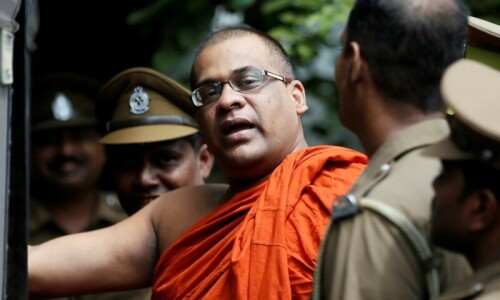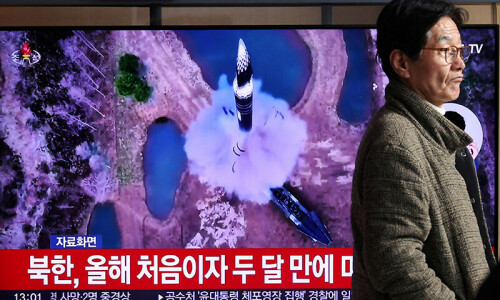GLOBALLY, 1.8m children below the age of five years die each year from diarrhoeal diseases and pneumonia. In Pakistan, respiratory infections and diarrhoeal diseases contribute 8pc and 6pc, respectively, of the total deaths every year, affecting mainly children under five.
This is tragic to say the least. Every child has the right to live and a simple act of handwashing with soap and clean running water during critical times could save lives. It could reduce incidences of diarrhoea and respiratory infections by up to 40pc and 21pc, respectively and may help prevent skin and eye infections thereby saving the lives of millions of children.
Lack of handwashing is also associated with the high stunting rate in Pakistan (40.2pc), due to repeated episodes of diarrhoea, which impacts on a child’s cognitive skills for his/ her entire life.
Unicef joins the world and the Pakistan government in celebrating Global Handwashing Day today, under Prime Minister Imran Khan’s initiative of Clean Green Pakistan. This movement has adopted the slogan of ‘leave no one behind’ from the UN’s Sustainable Development agenda and has the ambition of reaching out to every citizen in Pakistan.
Lack of handwashing is linked to high stunting rates.
While the movement led by the federal Ministry of Climate Change and provincial governments has a comprehensive roadmap for making Pakistan cleaner and greener, ‘hygiene’ stands out as the biggest behaviour change outcome. The 2019 theme for Global Handwashing Day, observed on Oct 15 every year, is ‘Clean Hands for All’.
The day is dedicated to increase awareness “about the importance of handwashing with soap as an effective and affordable way to prevent diseases and save lives”. Inequalities in access to handwashing facilities and programmes to reduce the risk of children and marginalised groups to diseases that impact their health, education and economic outcomes should be addressed.
According to the 2018 National Nutrition Survey, more than 20m people in Pakistan do not wash their hands with soap and clean water after using the latrine, while more than 60m don’t wash their hands after handling children or after changing babies’ diapers. Also, more than 50m people do not wash their hands before feeding a child. There is no doubt that such practices have a negative impact on the health of children.
This year’s theme encourages every stakeholder to address the inequalities related to access to effective handwashing facilities. More people who do not wash their hands during critical times comes from the rural areas as compared to those from the urban areas. This is probably because of the unavailability of safe water or soap for effective handwashing practices.
According to the 2017 WHO and Unicef Joint Monitoring Programme’s report, more than 80m people in Pakistan lack access to handwashing stations with clean water and soap. In institutions like schools and healthcare and handwashing facilities are either missing, inadequate, not functional or not inclusive.
Under the leadership of the Ministry of Climate Change, Unicef is providing technical and financial support in developing the Clean Green Pakistan roadmap where the government has shown its commitment to hygiene promotion. The roadmap has been rolled out nationwide and we will continue to collaborate with the government, donors and other developmental partners to ensure that everyone, especially children and women, have access to basic hygiene services.
Unicef will continue supporting the Clean Green Pakistan campaign and the implementation of the three-star schools’ approach “designed to improve the effectiveness of hygiene behaviour change programmes. The approach ensures that healthy habits are taught, practised and integrated into daily school routines”. Through these initiatives, Unicef thrives to ensure that handwashing policies and programmes are inclusive to all individuals in households, communities and institutions.
Conducting further research on hand-washing inequities in different settings is imperative and a significant element of our support to the government. The objective is to promote efficient and equitable distribution of resources and promote an effective and inclusive handwashing behaviour change to guide establishment of inclusive water, sanitation and hygiene (WASH) policies.
Motivated by the fact that handwashing with clean running water and soap during critical times can significantly reduce incidences of diarrhoea and absenteeism from school due to gastrointestinal illness, up to 57pc, I would like to call upon families, community leaders, institutions and policymakers to ensure that handwashing facilities are made available, affordable and accessible to everyone and handwashing is practised throughout critical times by all. As the saying goes, handwashing with soap is the ‘do it yourself’ vaccine!
The writer is Unicef representative in Pakistan.
Published in Dawn, October 15th, 2019












































